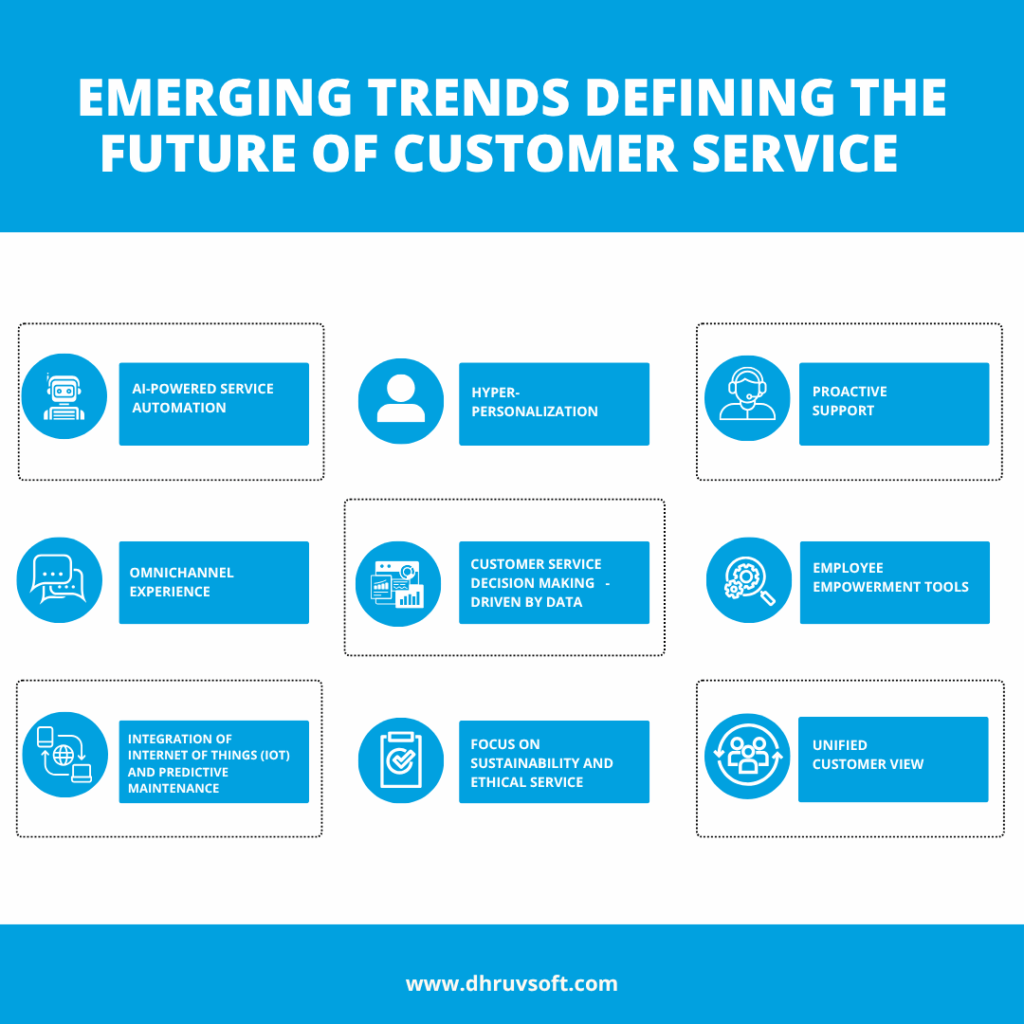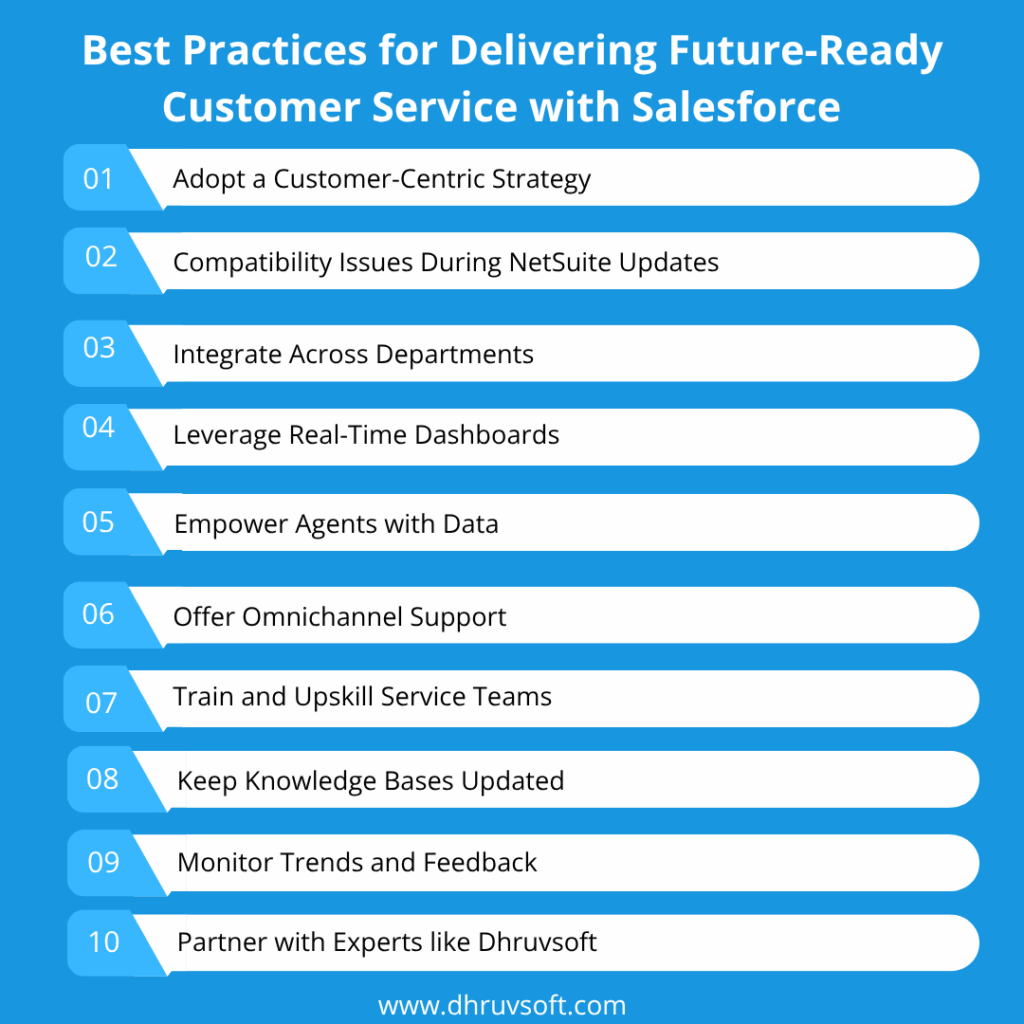
The Evolution of Customer Service
Customer service has evolved from being a reactive function to a strategic differentiator that defines brand loyalty. In today’s business world, customers expect more than just quick solutions; they demand personalized, connected, and proactive service. The standards have shifted toward real-time support, cross-channel engagement, and intelligent automation.
Over the past decade, advancements in artificial intelligence (AI), automation, and data analytics have completely transformed how organizations deliver customer experiences. Service excellence is now powered by intelligent systems that understand customer needs even before they are expressed.In this new era, Salesforce Service Cloud stands out as a forward-looking CRM platform designed to help organizations adapt to the changing service landscape. It enables service teams to deliver fast, personalized, and consistent support across every channel — helping businesses turn service challenges into opportunities for loyalty and growth.
The Changing Landscape of Customer Service
The expectations surrounding customer service have undergone a massive transformation. Today’s customers are always connected and expect brands to be available wherever they are — whether that’s social media, email, chat, or mobile apps.
Here are the major shifts shaping modern service operations:
- Omnichannel expectations: Customers no longer stick to one channel. They move fluidly between email, phone, live chat, and social platforms, expecting a consistent experience at every touchpoint.
- Self-service preference: Knowledge bases, AI-powered chatbots, and community forums are now the first stop for customers seeking quick answers.
- Data-driven service: Every customer interaction generates data. Organizations that use this data to personalise experiences gain a significant competitive edge.
- Remote service teams: The hybrid work environment requires digital collaboration tools that unify service operations.
- Relationship over resolution: The goal is no longer just to close a ticket — it’s to build trust, empathy, and long-term relationships.
To stay competitive, organizations must evolve now. Service excellence requires adopting technologies that bring speed, intelligence, and empathy into every customer interaction — and that’s where Salesforce plays a pivotal role.
Emerging Trends Defining the Future of Customer Service
The next decade will redefine how service organizations operate. Below are the key trends shaping the future of customer service and how they influence strategy:
1. AI-Powered Service Automation
AI-driven tools are transforming how service teams manage cases. From predictive case routing and intelligent chatbots to next-best-action recommendations, AI ensures that customers are served faster and more accurately.
2. Hyper-Personalization
Generic responses are no longer acceptable. Modern CRM systems analyse past interactions, preferences, and behaviour patterns to anticipate needs. Salesforce helps deliver tailored solutions that make each customer feel valued.
3. Proactive Support
Future-ready service is preventive rather than reactive. Predictive analytics identify potential issues before they impact customers, ensuring problems are solved before they’re even reported.
4. Omnichannel Experience
Customers expect seamless interactions across chat, email, voice, social, and in-person touchpoints. A unified platform like Salesforce integrates all these channels for a consistent and connected experience.
5. Customer Service Decision Making – Driven by Data
Analytics are now the backbone of service improvement. By analysing customer satisfaction (CSAT) trends and agent performance metrics, leaders can optimize workflows and forecast service demands.
6. Employee Empowerment Tools
Intuitive dashboards, guided workflows, and AI insights help agents work efficiently and focus on high-value interactions. Empowered service employees deliver better experiences to customers.
7. Integration of Internet of Things (IoT) and Predictive Maintenance
In industries such as manufacturing or utilities, IoT-enabled devices can automatically trigger service tickets when anomalies occur — creating proactive maintenance cycles.
8. Focus on Sustainability and Ethical Service
Customers increasingly prefer brands that operate responsibly. Future service strategies will prioritise eco-friendly practices, transparency, and ethical data usage.
9. Unified Customer View
Having a 360° customer profile — covering history, preferences, and engagement — ensures every service interaction is personalized and context-aware. These trends together shape a service ecosystem that is intelligent, connected, and customer-first — all capabilities where Salesforce leads the way.
How Salesforce Supports the Future of Service Excellence
Salesforce Service Cloud is designed to address every major shift in customer service. Here’s how it empowers service teams to stay future-ready:
- Unified Customer View: Salesforce centralises every customer interaction, from sales to service, ensuring teams have a complete 360° view.
- Einstein AI & Automation: Salesforce’s AI engine, Einstein, automates case routing, predicts resolutions, and recommends next actions — improving both speed and accuracy.
- Omnichannel Routing: Service Cloud routes each inquiry to the right agent based on expertise and workload, ensuring efficient handling.
- Knowledge Base & Self-Service: Organizations can build rich knowledge repositories and self-service portals, reducing the burden on agents.
- Field Service Management: Real-time scheduling and mobile updates keep on-site operations connected to the main service hub.
- Analytics and Dashboards: Built-in reports track KPIs such as response time, case closure rate, and customer satisfaction.
- Integration Flexibility: Salesforce easily connects with ERP, HR, or marketing systems to deliver seamless cross-department collaboration.
In short, Salesforce transforms reactive support into a predictive, data-driven, and customer-centric experience.
Benefits of Using Salesforce for Future-Ready Service Teams
Organizations that implement Salesforce Service Cloud gain measurable, long-term benefits:
- Faster Case Resolution: Automated workflows and AI insights reduce average handling times.
- Enhanced Personalization: Access to 360° customer data enables contextual interactions.
- Higher Agent Productivity: Guided workflows and automation minimize manual tasks.
- Improved Visibility: Real-time dashboards provide actionable intelligence.
- Scalable Operations: Salesforce grows with your business — from startups to global enterprises.
- Consistent Experiences: Unified data ensures uniform service quality across channels.
- Lower Operational Costs: Automation reduces repetitive work and improves efficiency.
- Better Compliance: Role-based access and audit trails enhance data governance.
- Stronger Customer Loyalty: Faster resolutions and personalized support build lasting trust.
Common Challenges Service Teams Face
While businesses recognize the importance of exceptional service, many still struggle with:
- Disconnected channels and tools leading to fragmented service experiences.
- Lack of unified data makes personalization difficult.
- Slow adoption of AI and automation.
- Inconsistent service quality across teams or regions.
- Limited visibility into agent and operational performance.
- Integration challenges with legacy systems.
- Insufficient training and low agent engagement.
- Inadequate feedback loops for continuous improvement
- Underutilization of CRM data and insights.
These barriers can erode customer trust and impact operational efficiency. Fortunately, Salesforce addresses each of these pain points effectively.
How Salesforce Helps Overcome These Challenges
Salesforce’s comprehensive ecosystem helps organizations overcome service challenges through:
- Centralized CRM: All customer data, cases, and communications reside in one unified platform, eliminating data silos.
- Einstein AI: Automates responses, predicts behaviour, and recommends the best course of action for faster resolutions.
- Unified Dashboards: Offer real-time visibility into key performance metrics and team productivity.
- Guided Workflows: Simplify onboarding and ensure agents follow best practices for each customer scenario.
- Powerful Integrations: APIs connect Salesforce to ERP, billing, HR, and logistics systems for full process visibility.
- Knowledge Management: Allows teams to create dynamic knowledge bases to handle repetitive inquiries efficiently.
- Advanced Analytics: Identifies process gaps, tracks CSAT trends, and provides actionable insights for continuous improvement.
With these tools, Salesforce not only streamlines service delivery but also helps organizations transform customer service into a strategic growth driver.
Best Practices for Delivering Future-Ready Customer Service with Salesforce
To make the most of Salesforce, organizations should align their CRM strategy with customer-centric goals. Here are key best practices:
- Adopt a Customer-Centric Strategy: Design every CRM workflow around enhancing the customer experience, not just managing data.
- Automate Repetitive Workflows: Use Einstein AI to manage frequent inquiries and automate follow-ups, freeing agents to focus on complex cases.
- Integrate Across Departments: Connect sales, marketing, and service functions to ensure seamless communication and data sharing.
- Leverage Real-Time Dashboards: Continuously monitor response times, resolution rates, and satisfaction levels to make data-backed decisions.
- Empower Agents with Data: Equip service teams with complete customer histories and preferences for context-rich interactions.
- Offer Omnichannel Support: Through Salesforce Digital Engagement, manage every interaction — from WhatsApp to voice — in one unified interface.
- Train and Upskill Service Teams: Regular training on Salesforce tools ensures adoption, confidence, and improved agent performance.
- Keep Knowledge Bases Updated: Review and update content regularly to maintain accuracy in self-service portals.
- Monitor Trends and Feedback: Use Service Analytics to track emerging customer expectations and adapt strategies accordingly.
- Partner with Experts like Dhruvsoft: Experienced Salesforce partners ensure smooth implementation, customization, and long-term optimization.
By combining these best practices with Salesforce’s powerful tools, organizations can create a sustainable service culture ready for future challenges.
The Leadership Perspective: Why Service Leaders Choose Salesforce
Different leadership roles view Salesforce’s benefits through unique lenses:
- CEOs and COOs: Value Salesforce’s ability to align customer service with business strategy and brand promise.
- CFOs: Appreciate measurable ROI through improved operational efficiency and cost savings from automation.
- CIOs: Trust Salesforce’s scalability, robust security, and seamless integration capabilities.
- Customer Service Heads: Rely on Salesforce to balance technology-driven automation with the human empathy needed for meaningful experiences.
Salesforce provides a common platform that unites leadership and frontline teams around a shared vision of service excellence and customer loyalty.
The Future of Service Excellence: Data, AI, and Human Connection
As technology continues to evolve, the future of service will be defined by the balance between automation and empathy.
- AI will augment, not replace, humans. Agents will handle fewer but more meaningful interactions, supported by real-time insights.
- Predictive service will become standard — anticipating issues before customers even contact support.
- Emotional intelligence and empathy will remain at the heart of great service experiences.
- Salesforce innovation — including Einstein Copilot, Voice AI, and Generative Service Summaries — will continue empowering service teams to deliver faster, more humanised support.
The brands that succeed in the future will be those that combine data, AI, and human connection to create unforgettable experiences.
Why Dhruvsoft Is a Trusted Salesforce Partner
As organizations aim to modernise their service operations, partnering with the right Salesforce expert becomes crucial. Dhruvsoft has established itself as a trusted partner for implementing, customising, and optimising Salesforce Service Cloud.
- Experience: Decades of combined experience across industries and CRM projects.
- Expertise: Certified Salesforce professionals specializing in Service Cloud and Customer Experience Transformation.
- Authoritativeness: Recognized Salesforce Partner with proven success in CRM modernization.
- Trustworthiness: Transparent approach, measurable outcomes, and long-term client partnerships.
Dhruvsoft doesn’t just implement technology — it transforms service operations for the digital era.
Conclusion: Delivering Service Excellence in the Future
Customer service excellence is entering a new era — one defined by AI, automation, and human empathy. Organizations that invest today in intelligent CRM systems like Salesforce Service Cloud will lead tomorrow’s market.
Salesforce enables service teams to anticipate needs, resolve issues faster, and build relationships that last. As emerging technologies reshape customer expectations, Salesforce ensures that businesses remain agile, data-driven, and customer-focused.
Empower your service teams with Salesforce.
Connect with Dhruvsoft today to design a CRM strategy that drives customer satisfaction, operational efficiency, and future readiness.

